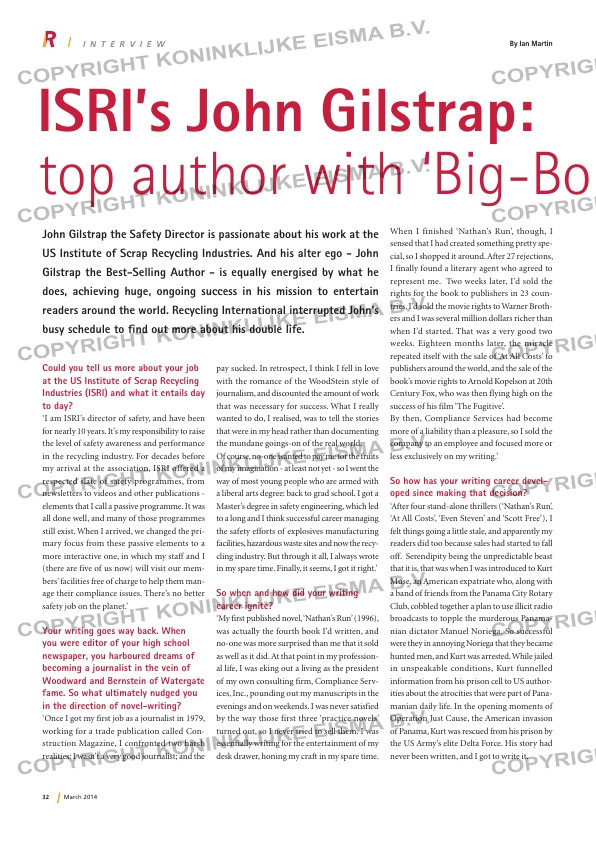Page 32 from: March 2014

32 March 2014
ISRI’s John Gilstrap:
Could you tell us more about your job
at the US Institute of Scrap Recycling
Industries (ISRI) and what it entails day
to day?
‘I am ISRI’s director of safety, and have been
for nearly 10 years. It’s my responsibility to raise
the level of safety awareness and performance
in the recycling industry. For decades before
my arrival at the association, ISRI offered a
respected slate of safety programmes, from
newsletters to videos and other publications –
elements that I call a passive programme. It was
all done well, and many of those programmes
still exist. When I arrived, we changed the pri-
mary focus from these passive elements to a
more interactive one, in which my staff and I
(there are five of us now) will visit our mem-
bers’ facilities free of charge to help them man-
age their compliance issues. There’s no better
safety job on the planet.’
Your writing goes way back. When
you were editor of your high school
newspaper, you harboured dreams of
becoming a journalist in the vein of
Woodward and Bernstein of Watergate
fame. So what ultimately nudged you
in the direction of novel-writing?
‘Once I got my first job as a journalist in 1979,
working for a trade publication called Con-
struction Magazine, I confronted two harsh
realities: I wasn’t a very good journalist; and the
pay sucked. In retrospect, I think I fell in love
with the romance of the WoodStein style of
journalism, and discounted the amount of work
that was necessary for success. What I really
wanted to do, I realised, was to tell the stories
that were in my head rather than documenting
the mundane goings-on of the real world.
Of course, no-one wanted to pay me for the fruits
of my imagination – at least not yet – so I went the
way of most young people who are armed with
a liberal arts degree: back to grad school. I got a
Master’s degree in safety engineering, which led
to a long and I think successful career managing
the safety efforts of explosives manufacturing
facilities, hazardous waste sites and now the recy-
cling industry. But through it all, I always wrote
in my spare time. Finally, it seems, I got it right.’
So when and how did your writing
career ignite?
‘My first published novel, ‘Nathan’s Run’ (1996),
was actually the fourth book I’d written, and
no-one was more surprised than me that it sold
as well as it did. At that point in my profession-
al life, I was eking out a living as the president
of my own consulting firm, Compliance Serv-
ices, Inc., pounding out my manuscripts in the
evenings and on weekends. I was never satisfied
by the way those first three ‘practice novels’
turned out, so I never tried to sell them. I was
essentially writing for the entertainment of my
desk drawer, honing my craft in my spare time.
When I finished ‘Nathan’s Run’, though, I
sensed that I had created something pretty spe-
cial, so I shopped it around. After 27 rejections,
I finally found a literary agent who agreed to
represent me. Two weeks later, I’d sold the
rights for the book to publishers in 23 coun-
tries, I’d sold the movie rights to Warner Broth-
ers and I was several million dollars richer than
when I’d started. That was a very good two
weeks. Eighteen months later, the miracle
repeated itself with the sale of ‘At All Costs’ to
publishers around the world, and the sale of the
book’s movie rights to Arnold Kopelson at 20th
Century Fox, who was then flying high on the
success of his film ‘The Fugitive’.
By then, Compliance Services had become
more of a liability than a pleasure, so I sold the
company to an employee and focused more or
less exclusively on my writing.’
So how has your writing career devel-
oped since making that decision?
‘After four stand-alone thrillers (‘Nathan’s Run’,
‘At All Costs’, ‘Even Steven’ and ‘Scott Free’), I
felt things going a little stale, and apparently my
readers did too because sales had started to fall
off. Serendipity being the unpredictable beast
that it is, that was when I was introduced to Kurt
Muse, an American expatriate who, along with
a band of friends from the Panama City Rotary
Club, cobbled together a plan to use illicit radio
broadcasts to topple the murderous Panama-
nian dictator Manuel Noriega. So successful
were they in annoying Noriega that they became
hunted men, and Kurt was arrested. While jailed
in unspeakable conditions, Kurt funnelled
information from his prison cell to US author-
ities about the atrocities that were part of Pana-
manian daily life. In the opening moments of
Operation Just Cause, the American invasion
of Panama, Kurt was rescued from his prison by
the US Army’s elite Delta Force. His story had
never been written, and I got to write it.
I n t e r v I e w By Ian Martin
John Gilstrap the Safety Director is passionate about his work at the
US Institute of Scrap Recycling Industries. And his alter ego – John
Gilstrap the Best-Selling Author – is equally energised by what he
does, achieving huge, ongoing success in his mission to entertain
readers around the world. Recycling International interrupted John’s
busy schedule to find out more about his double life.
top author with ‘Big-Bo y’ recycling job
RI-2-2014-Interview.indd 32 05-03-14 15:19



